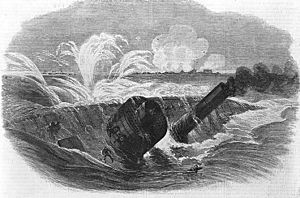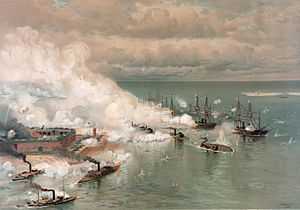USS Tecumseh (1863) facts for kids

Tecumseh strikes a mine and sinks
|
|
Quick facts for kids History |
|
|---|---|
| Name | USS Tecumseh |
| Namesake | Tecumseh |
| Ordered | 15 September 1862 |
| Builder | Charles Secor & Co., Jersey City, New Jersey |
| Laid down | 1862 |
| Launched | 12 September 1863 |
| Commissioned | 19 April 1864 |
| Fate | Sunk during the Battle of Mobile Bay, 5 August 1864 |
| General characteristics | |
| Type | Canonicus-class monitor |
| Tonnage | 1,034 tons (bm) |
| Displacement | 2,100 long tons (2,100 t) |
| Length | 223 ft (68.0 m) |
| Beam | 43 ft 4 in (13.2 m) |
| Draft | 13 ft 6 in (4.1 m) |
| Installed power |
|
| Propulsion |
|
| Speed | 8 knots (15 km/h; 9.2 mph) |
| Complement | 100 officers and enlisted men |
| Armament | 2 × 15-inch (381 mm) smoothbore Dahlgren guns |
| Armor |
|
|
U.S.S. Tecumseh
|
|
| Nearest city | Fort Morgan, Alabama |
| Area | 0 acres (0 ha) |
| Built | 1862 |
| Architect | Charles A. Secor & Co. |
| NRHP reference No. | 75000306 |
| Added to NRHP | 14 May 1975 |
The USS Tecumseh was a special type of warship called a monitor. It was built for the United States Navy during the American Civil War. Monitors were known for their strong armor and powerful guns.
Tecumseh was meant to help attack Confederate forts protecting Mobile Bay. This was part of Rear Admiral David Farragut's plan. However, the ship was first sent to the James River Flotilla in April 1864. There, it helped place obstacles in the river and fought against Confederate artillery batteries in June.
Sadly, Tecumseh sank on August 5, 1864, during the Battle of Mobile Bay. It hit a mine (which they called a "torpedo" back then). The ship flipped over and now rests upside down near Fort Morgan. People have tried to raise the wreck, but it has not happened yet.
Contents
About the USS Tecumseh
The USS Tecumseh was a monitor, a type of warship with heavy armor and large guns. It was 223 feet (68 m) long and 43 feet 4 inches (13.2 m) wide. The ship weighed about 2,100 long tons (2,100 t) and had a crew of 100 sailors and officers.
Ship's Power and Speed
Tecumseh was powered by a steam engine that turned one propeller. This engine got its steam from two large boilers. The engine gave the ship a top speed of 8 knots (15 km/h; 9.2 mph), which is about 9 miles per hour. This was a good speed for a heavily armored ship of its time.
Powerful Guns and Strong Armor
The main weapons on Tecumseh were two huge 15-inch (381 mm) Dahlgren guns. These guns were mounted in a single, rotating gun turret. Each gun weighed about 43,000 pounds (20,000 kg) and could fire a 350-pound (158.8 kg) shell.
The ship was built to be very tough. Its sides had five layers of strong iron plates. The gun turret and the pilot house (where the ship was steered) had even thicker armor, with ten layers of one-inch plates. The ship's deck was also protected by thick armor.
Service History
After being finished, Tecumseh joined the North Atlantic Blockading Squadron in Virginia. It arrived there on April 28, 1864.
Protecting the James River
In May 1864, Tecumseh was ordered to protect transport ships carrying soldiers up the James River. To stop Confederate warships, Union forces blocked the river channel in June. Tecumseh helped by sinking old ships and laying barriers across the river.
On June 21, Tecumseh spotted Confederate soldiers building defenses. The ship opened fire, and other Union ships joined in. The Confederates fired back, but their shots did not hit Tecumseh. During this fight, Tecumseh fired many shells and was not damaged.
Journey to Mobile Bay
A few days later, Tecumseh sailed towards Norfolk. On the way, it ran aground because its steering ropes broke. The ship was freed a few hours later and spent a week getting repaired.
On July 5, Tecumseh began its journey to Pensacola, Florida, to join the fleet preparing for the Battle of Mobile Bay. It was towed by other ships. After some repairs along the way, Tecumseh finally arrived off Mobile Bay on the evening of August 4.
The Battle of Mobile Bay
Before the battle, Admiral Farragut told Commander Craven, Tecumseh's captain, about the plan. Tecumseh and another monitor were supposed to keep the Confederate ironclad CSS Tennessee away from the weaker wooden Union ships.
On August 5, 1864, the battle began. Tecumseh started firing at Fort Morgan's lighthouse. Confederate ships and the fort soon fired back. Commander Craven saw that to stop the CSS Tennessee, he would have to go through an area known to have "torpedoes" (mines).
At 7:40 AM, Tecumseh hit a mine. The ship sank in less than 30 seconds. Commander Craven and 94 of his crew went down with the ship. Only 17 men survived. Some were rescued by a boat from another Union ship, while others swam to shore but were captured.
The Wreck of Tecumseh
The Tecumseh sank upside down in about 30 feet (9.1 m) of water. It rests about 300 yards (270 m) northwest of Fort Morgan.
Efforts to Raise the Ship
In the 1870s, someone bought the rights to salvage the wreck. However, families of the lost crew members asked Congress to stop this. Congress agreed, saying that any salvage efforts must properly remove and bury the crewmen's remains.
In the 1960s, the Smithsonian Institution planned to raise the ship to display it in a museum. They found the wreck in 1967, but the funding for the project was canceled. Later, in 1993, archaeologists found the hull to be in good condition, covered by a protective layer.
Raising Tecumseh would be very expensive, costing tens of millions of dollars. Divers have recovered some items from the wreck, like an anchor and dishes. The ship's engine room gong is now in a museum. The wreck site is marked and protected, as it is considered a war grave. It cannot be disturbed without special permission.
 | James B. Knighten |
 | Azellia White |
 | Willa Brown |




